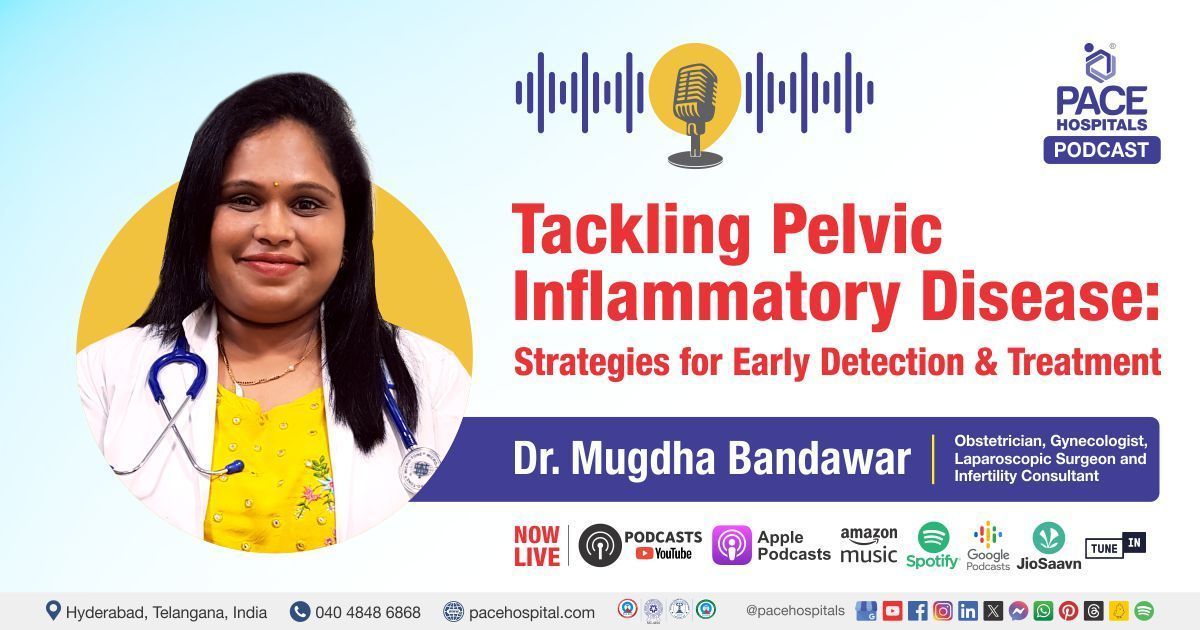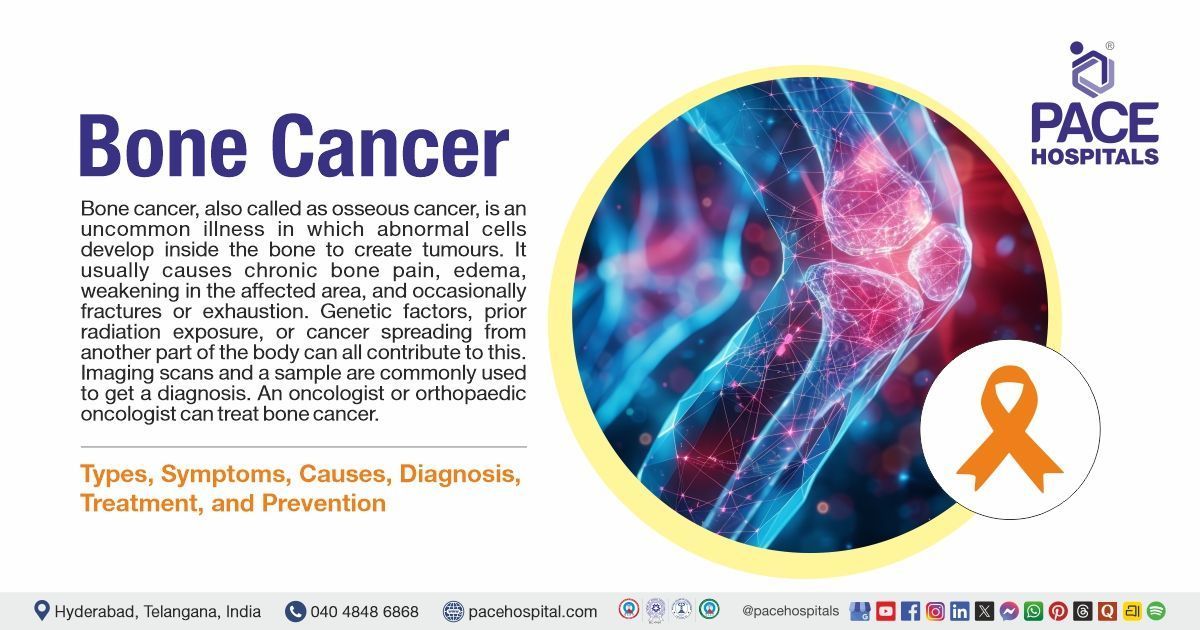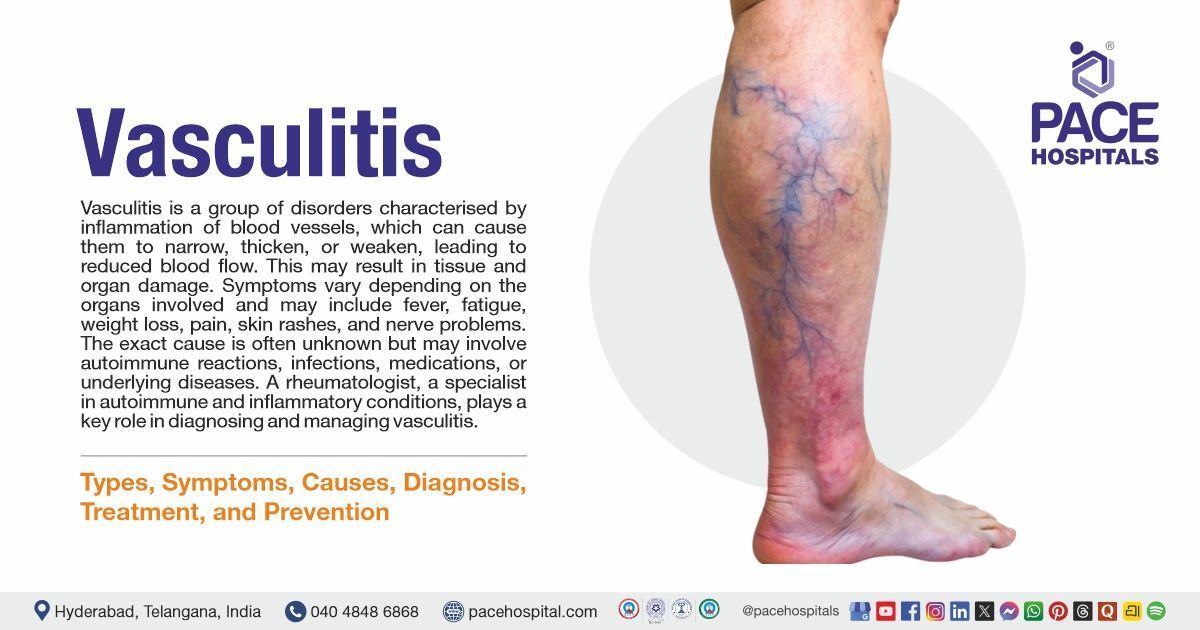Tackling Pelvic Inflammatory Disease (PID): Strategies for Early Detection and Treatment
PACE Hospitals
Listen to
Transcript
Host: Hello and welcome to the PACE Hospitals Podcast. Today, we're delving into a critical aspect of women's health: Pelvic Inflammatory Disease, or PID. A condition with far-reaching implications, PID affects millions of women worldwide, yet remains widely misunderstood.
Joining us today Dr. Mugdha Bandawar - Obstetrician, Gynaecologist, Laparoscopic Surgeon and Infertility Consultant.
Today she would like to unravel the complexities of PID, exploring its causes, symptoms, treatments, and the importance of proactive management.
Dr. Mugdha thank you for joining us at PACE Hospitals, Hitech City
Doctor: Thank you for inviting me today, I would like to discuss a topic of paramount importance in women's health: Pelvic Inflammatory Disease, or PID. And also want to delve into the complexities of this condition, its far-reaching implications, and the crucial steps we can take to prevent and manage it effectively.
Host: Dr. Mugdha thank you for joining us lets understand exactly what is Pelvic inflammatory disease (PID)?
Doctor: So it's a spectrum of infection and inflammation,of the pelvic genital organs, specifically involving uterus, that is, endometrium of the uterus, tubes, ovaries, pelvic peritoneum and all the structures surrounding it. So the cervix, which is located inside the vagina, it ascends the infection from the vagina, carrying it upwards and affecting any organs which is surrounding it.
Host: So doctor, are there any specific risk factors that increase the likelihood of developing PID?
Doctor: So people with multiple sexual partners or early teenage girls, menstruating teenage girls, because in these women they will not be a proper defense mechanism to prevent the infection Or people with copper T or IUCD is inserted, or sometimes partners having some urethritis or some infections, or some sexually transmitted infections. These people are at more risk of having pelvic inflammatory disease or sometimes even immunocompromised people will also have risk of getting these infections.
Host: What are some of the common symptoms of PID that women should be aware of?
Doctor: Dull, aching abdominal pain, which is not associated with any other complaints or maybe sometimes fever, or just generalized weakness. Some menstrual irregularities like heavy bleeding or foul bleeding, or sometimes even excessive multiple periods in a month, or sometimes even purulent white discharge, which is very heavy and foul in smell or even the most important symptoms is a dyspareunia, which is painful sex or pain after intercourse, or irritation and itching during intercourse and all these things. These are the symptoms of PID.
Host: What are various diagnostic tests for pelvic inflammatory disease?
Doctor: So we go through a multiple series of examination which includes blood examination, then physical examination of the cervix and taking a swab and sending it to culture and even doing a pap smear.
Blood test which includes STD's examination and any risk factors present any immunocompromised patient examination, even doing an ultrasound which will show signs of inflammations, free fluid in the abdomen or cervicitis endometritis these are some of the mentions in this case which can be suggesting to PIDs and the definitive is definitely doing a diagnostic laparoscopy which will show some signs of inflammation like red string like appearance, string like adhesions which are clearly indications of PID.
Host: What are the treatment options for pelvic inflammatory disease?
Doctor: So treatment is definitely depends on the severity of the infection. Our goals majorly is to prevent future infertility and also its recurrence, so we can treat it on the outpatient basis by giving some analgesics and some antibiotics and also some pre probiotics, on which basis some good bacteria’s can come up and heal you internally. But if the patient is not responding for more than 48 hours or if the symptoms have not come down in that 48 to 72 hours, it is always advisable to go for inpatient admission and treating you accordingly.
Inpatient we give iv antibiotics and also we give supportive care like we treat for any dehydration if present or any painkillers and according to the culture report, antibiotics are also started. Definitely IV antibiotics are more potent to treat pelvic inflammatory disease.
In some cases where an abscess is present or some pyosulfings or hydrosulfings or some cases which are not responding to even highway drugs. In that case, laparoscopy is suggested for the removal of the abscess or removal of the tubes. If any problem in the tubes and all it is suggested.
Host: What are the potential long term complications associated with untreated pelvic inflammatory disease?
Doctor: So complications can be immediate as well as late complications, late sequel immediate complications is basically peritonitis, which can be generalized or pelvic peritonitis and then septicemias involving myocarditis arthritis, this can be the immediate effect of or acute PIDs. Then what are the complications?
Later, which occurs is basically revolving around infertility, which can be due to the blockage of tubes or sometimes ectopic pregnancy, in which also the tubes is only the main important reason because of which you can have ectopic pregnancy and sometimes forming an abscess or sometimes dyspareunia is very important reason and sometimes adhesion formations and resulting into hydrosulfings. Bio-sulfings can be the late sequel of the disease.
Host: What are the most effective strategies for preventing PID?
Doctor: So prevention can be generalized? Prevention like taking proper diet, proper hygiene practice and some basic prevention like definitely using a barrier method of contraceptive like condoms or even using oral contraceptive can be a method of prevention and avoiding multiple sexual partners.
Even partner evaluation for any STD's or any infections, then taking vaccines like HPV vaccines can also be very helpful in preventing PID. We might be able to cure some specifically presenting symptoms, but sometimes due to the spoilage of tubes, we might not be able to prevent some complications like ectopic pregnancies and all in future.
But definitely at least we can make a patient understand the severity of the problem and therefore we can make them aware of something called ectopic pregnancy or infertility and tell them to be very cautious whenever they miss their period and all.
Host: Can a child get pelvic inflammatory disease?
Doctor: It depends on what is the age of the child. It is not only that sexually active women will be having pelvic inflammatory disease. As I already told you, teenagers with menstruation can be infected also definitely because they don't have very good defence mechanism developed so they can be infected. It depends on the age of the child.
Host: Can pelvic inflammatory disease cause infertility?
Doctor: Yes, actually pelvic inflammatory disease is very very important reason of infertility. Sometimes blockage of tubes or even any infection in the tubes is the reason of people having infertility.
Host: Can vaginitis be a cause of pelvic inflammatory disease?
Doctor: You cannot say vaginitis is the cause. Vaginitis is a milder form of pelvic inflammatory disease. In PID, what we generally say is if it is infecting the vagina, we call it vaginates. If it is infecting the endometrium, we call this endometrium. If it is infecting the tubes, we call it selfingitis and accordingly we name it as PID.
Thank you Dr. Mugdha for being with us to share crucial information on topic Pelvic Inflammatory Disease
Doctor: I hope this information can be valuable for the listeners as raising awareness about Pelvic Inflammatory Disease (PID) is vital for empowering individuals to take control of their reproductive health. By understanding the risk factors, recognizing the symptoms, and prioritizing preventive measures such as safe sex practices, regular screenings, and avoiding douching, we can collectively work towards reducing the prevalence of PID and its associated complications.
Host: If any of you have any further questions regarding PID please don’t hesitate to consult a Gynaecologist, as it's important to recognize the significance of reproductive health awareness. By understanding the signs, symptoms, and risk factors associated with PID, we empower ourselves to take proactive steps towards prevention and early intervention.
We will back soon with another episode on PACE Hospitals Podcast until next time, stay informed, seek regular check-ups and take care of yourself as your well-being matters
Pelvic Inflammatory Disease, or PID, is an infection of the female reproductive organs. It generally occurs when sexually transmitted bacteria move from the vagina to the uterus, fallopian tubes, or ovaries, resulting in inflammation and potentially leading to serious consequences if not addressed.
Pelvic Inflammatory Disease is a common condition that affects millions of women around the world. In this episode of the Pelvic Inflammatory Disease (PID) Podcast, we will explore the details of this often-misunderstood condition. We will cover its causes, symptoms, and most importantly, discuss how to manage it effectively. So, let's embark on this journey together and equip ourselves with knowledge and understanding, empowering us to take control of our health.
Join the PACE Hospitals Podcast with Dr. Mugdha Bandawar - Obstetrician, Gynaecologist, Laparoscopic Surgeon and Infertility Consultant at PACE Hospitals, Hitech City, Hyderabad, India, to recognize the importance of reproductive health awareness.
Share on
Request an appointment
Fill in the appointment form or call us instantly to book a confirmed appointment with our super specialist at 04048486868











